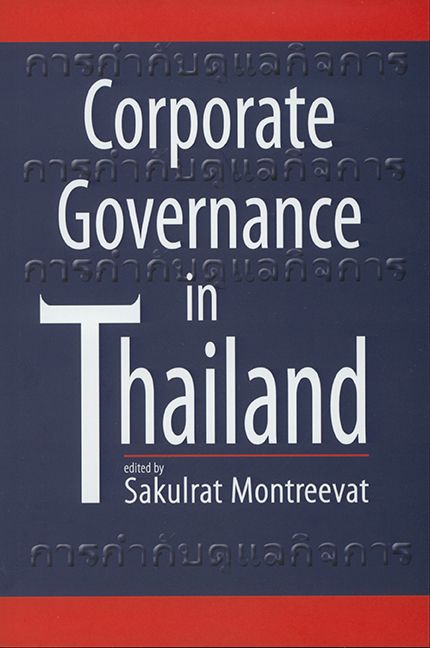Book contents
- Frontmatter
- Contents
- List of Tables
- List of Figures
- List of Abbreviations
- Acknowledgements
- Contributors
- Introduction
- 1 Transparency and Accountability of Listed Non-Financial Companies in Post-Crisis Thailand
- 2 Good Governance in the Thai Banking System
- 3 Corporate Governance among State-Owned Enterprises in Thailand
- 4 Thai Company Laws and Good Governance Practices of Unlisted Companies
- Concluding Remarks
- Index
Concluding Remarks
Published online by Cambridge University Press: 21 October 2015
- Frontmatter
- Contents
- List of Tables
- List of Figures
- List of Abbreviations
- Acknowledgements
- Contributors
- Introduction
- 1 Transparency and Accountability of Listed Non-Financial Companies in Post-Crisis Thailand
- 2 Good Governance in the Thai Banking System
- 3 Corporate Governance among State-Owned Enterprises in Thailand
- 4 Thai Company Laws and Good Governance Practices of Unlisted Companies
- Concluding Remarks
- Index
Summary
Good corporate governance is promoted nation-wide in Thailand. The Securities and Exchange Commission (SEC) and the Stock Exchange of Thailand (SET) have taken steps to help Thailand improve in this area as well as increase the efficiency of the Thai capital market.
Transparency and accountability to shareholders are the core elements for improving corporate governance. And there are regulatory and voluntary measures to ensure that companies listed on the SET observe them.
The voluntary approaches undertaken by listed companies cover board composition, guidelines for best practices, disclosure, protection of shareholders’ rights, setting up committees to promote good corporate governance, education on good corporate governance, integrated marketing communication campaigns, awards and contests, research and monitoring studies on corporate governance, and corporate governance ratings. On the regulatory front, the authorities are looking into how some relevant legal instruments can be effectively used, for example, the Public Company Act, the new Securities and Exchange Commission Act, the Bank of Thailand Act, as well as bankruptcy laws.
It is recommended that Thailand'slegal enforcement be intensified. The public should also be invited to lend their support to help the country develop a self-monitoring system. In addition, campaigns and other efforts to promote good corporate governance should be sustained for there to be any real lasting improvement in Thai corporate governance.
In the Thai banking sector, the Bank of Thailand (BOT) has issued guidelines on what constitutes good governance based on international standards. A survey has shown that the best governed banks in Thailand still lag far behind the average well-governed banks in Asia. Obviously a lot more effort is needed in this area to enable Thailand to measure up to international standards, for instance, more effective legal infrastructure could be put in place to ensure transparency, accountability, and fairness in the Thai banking sector.
As for state-owned enterprises (SOEs), efforts have thus far been focused on boosting efficiency rather than transparency. The governance and performance of SOEs can be further improved by raising standards of disclosure and assessing performance, as well as providing greater incentives to increase compliance. The carrot-and-stick approach on its own is insufficient to push SOEs to embrace good corporate governance.
- Type
- Chapter
- Information
- Corporate Governance in Thailand , pp. 110 - 112Publisher: ISEAS–Yusof Ishak InstitutePrint publication year: 2005

